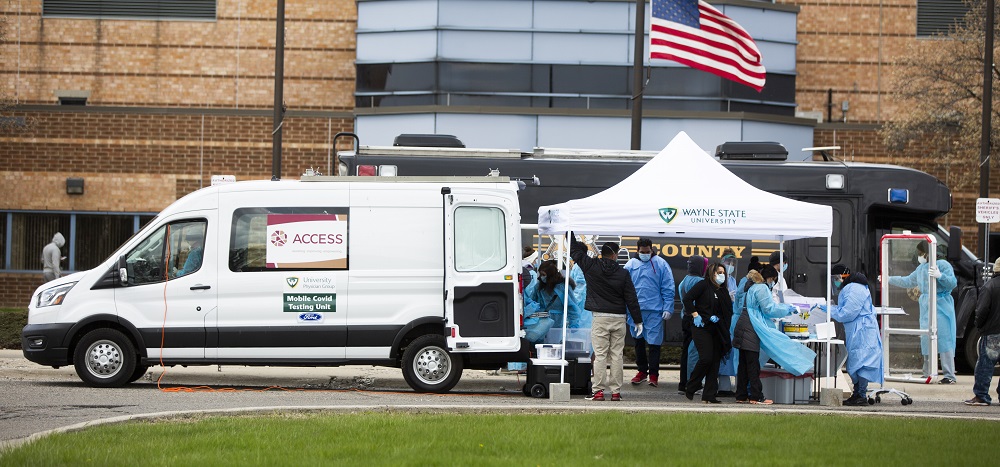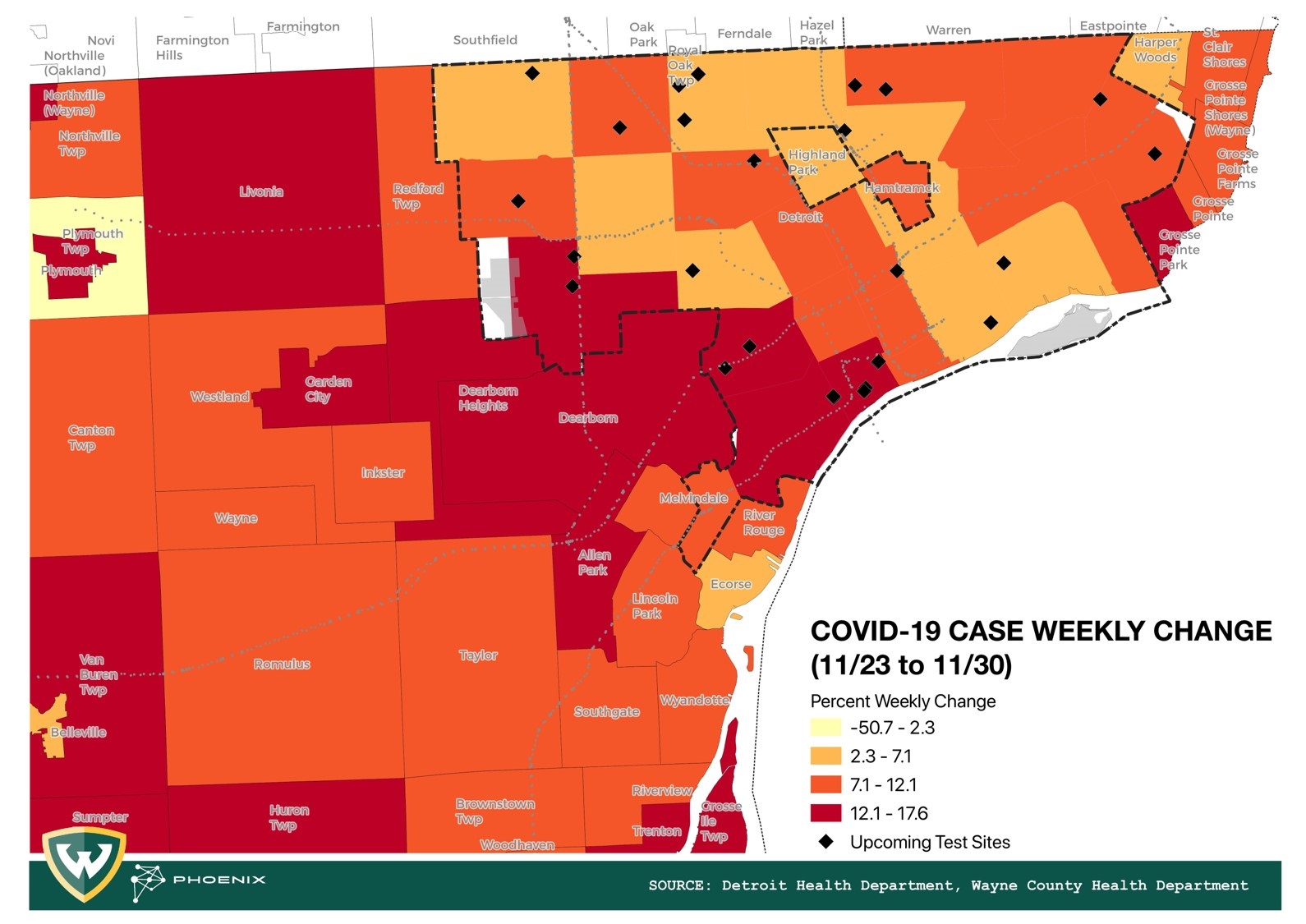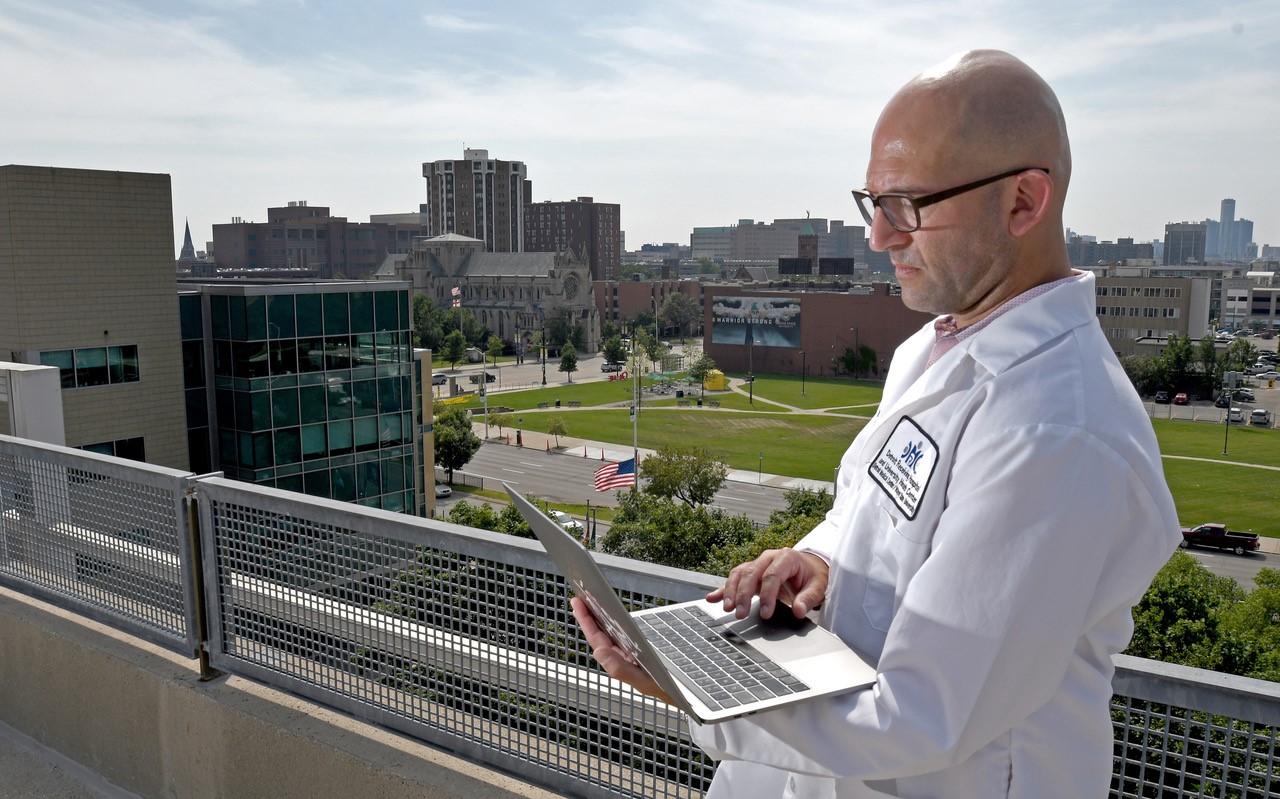
State officials are building upon the robust COVID-19 mobile testing program launched by Wayne State University and Wayne Health in April by increasing the mobile testing infrastructure that can be extended for other health services such as vaccine administration.
The statewide expansion is one of four initiatives announced as part of the state’s Racial Disparities Task Force Interim Report. The report details the significant progress Michigan has made in protecting communities of color from the spread of COVID-19. From March and April to September and October, the average cases per million per day for African American Michiganders dropped from 176 to 59. In the same period, the number of probable deaths per million per day among African American Michiganders dropped from 21.7 to 1.

Through a coalition of WSU, Wayne Health, and the Ford Motor Co., the mobile testing units have visited nearly 200 different locations in the regions and tested more than 27,000 people. All sites offer free testing. A prescription is not required for someone to be tested, nor is identification. The units go to three sites every day but Sunday, including schools, churches, nursing homes and other municipal centers throughout southeast Michigan, and started doing so at a time when testing was hard to come by.
The state has committed to providing three additional units to Wayne Health.
“It’s great to see such positive trends which build upon the work we started here,” said Phillip Levy, M.D., M.P.H., who leads the Mobile COVID Testing Program for Wayne Health and WSU.
Dr. Levy is WSU’s assistant vice president for Translational Sciences and Clinical Research Innovation, a professor and associate chair for Research in the Department of Emergency Medicine, as well as Wayne Health’s chief innovation officer.
“This is Wayne leading the way for something that is much needed and directly benefits our community,” he said. “We recognized a need early, moved quickly, and now others are emulating it. Importantly, the approach we developed isn’t just about COVID testing, it’s about making sure we provide community members with the social and health care needs that are essential to keep them well.”

Community members utilizing the services are also screened for additional needs such as public benefit services like Medicaid and cash assistance, unemployment assistance, emergency services such as food and shelter, and more, with the goal of having linkage to services made before leaving the testing site. They’re also asked if they would like to be connected to a primary care provider. ACCESS and the Detroit Parent Network assist with this, providing on site patient navigators who work directly with those in need.
Dr. Levy is also the mind behind the Population Health OutcomEs aNd Information Exchange, known better as PHOENIX. The novel geocoded map housed at WSU uses de-identified electronic health records in combination with information on population-level social determinants to paint an overall picture of health in Michigan area by area, using color-coding to graphically display differences. In the case of COVID-19, PHOENIX mines data from the Detroit and Wayne County health departments to inform Dr. Levy’s team of where to schedule the units for maximum effectiveness and outreach to those who need it most. Test sites change based on the weekly numbers.
“It is really gratifying to see our model being leveraged by the state and other locations building upon the approach we developed and refined. We are grateful to our initial supporters from philanthropic community who made this this initiative possible and to the state for adopting it as a pillar of their testing expansion,” Dr. Levy said. “Outcomes for COVID depend on so many factors and our mission it to support, in every way possible, those who come to one of our test sites.”
The mobile testing units are one of several ways the School of Medicine has impacted the most vulnerable in the face of COVID-19. In the early stages of the pandemic, students collected personal protective equipment for Wayne’s affiliated hospitals, and provided child care and household management for frontline workers battling the virus at work. They also assisted in manufacturing hand sanitizer in WSU labs to donate to Detroit’s police officers. In March, Wayne Health faculty established the first drive-through testing site in Detroit, testing thousands of police officers, firefighters and health care workers, some of whom could not get tested at their own hospitals.
Faculty used existing supplies to put together more than 12,000 test kits for the drive-through test site later opened by the city of Detroit. And in March, Wayne Health purchased four new devices that provided rapid, on-site test processing and placed them in the Detroit Medical Center for faster results in tested patients. WSU is also involved in a number of the national vaccine testing programs, and in conjunction with Johns Hopkins is conducting outpatient clinical trials involving convalescent blood plasma from infected donors in antibody research.
For more information on the mobile testing units, including the site schedule, visit waynehealthcares.org/mobile-health-unit/.
For more information on PHOENIX, visit med.wayne.edu/data-mapping and and http://phoenix.wayne.edu/